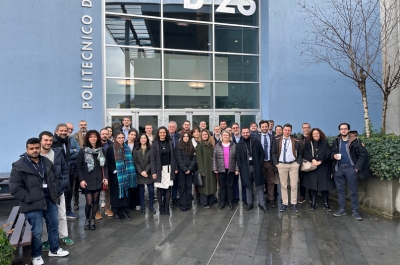
The ReBoat project has officially started with its kick-off meeting held at the end of January at the Department of Mechanical Engineering of Politecnico di Milano. Coordinated by Professor Marcello Colledani, this groundbreaking initiative aims to transform waste management in island environments through a decentralized and mobile recycling solution.
Funded by the European Union, ReBoat (which extended title is Circular Systemic Solution for Sustainable Tourism in European Islands by Movable Plant on a Boat and Co-Creation with Island Stakeholders) is designed to address waste generation peaks in island regions by deploying a mobile, modular, sorting, recycling, and reprocessing plant on a boat. The solution will be validated through two pilot projects in the Eolian and Ionian Islands, engaging local communities and stakeholders in a co-creation process that merges sustainability with creativity, while another pilot will be activated soon.
At the heart of the ReBoat project is an advanced recycling system housed within a transportable container aboard the boat. This mobile facility is equipped with cutting-edge technologies for waste sorting, mechanical recycling, and upcycling processes, focusing primarily on plastics and textiles. The system incorporates several recycling and reprocessing technologies to transform waste into functional productsThe ability to relocate and deploy these processes on demand makes ReBoat a flexible and adaptable solution for island waste management.
The project seeks to establish a circular ecosystem by involving citizens, tourists, artists, designers, architects, and artisans. Through a series of 4-week events, ReBoat will deploy its innovative mobile plant to process waste materials, primarily plastics and textiles, converting them into new, useful products, in particular at local level. This initiative is not just about waste management; it is about fostering social change by promoting sustainable tourism, revitalizing local craftsmanship, and raising awareness of circular economy principles.
During the first two weeks of operation on each island, the mobile plant will function as a waste sorting, recycling, and reprocessing facility. In the following two weeks, the space will transform into a creative laboratory, where citizens and visitors can actively participate in the transformation of waste into new objects. This aims to educate and inspire, demonstrating the tangible benefits of circular economy practices in a hands-on and engaging manner. Local businesses, artisans, and students will also be invited to experiment with the recycled materials, fostering innovation and community-driven solutions, also exploring working tourism approaches.
The ReBoat consortium consists of 14 partners from 7 EU Member States, each bringing expertise in island tourism, circular economy processes, and digital innovation. By validating its methodology in the Eolian and Ionian Islands, the project aims to define a scalable and replicable model that can be extended to other rural and peripheral regions, paving the way for a more sustainable and inclusive future for European islands.
